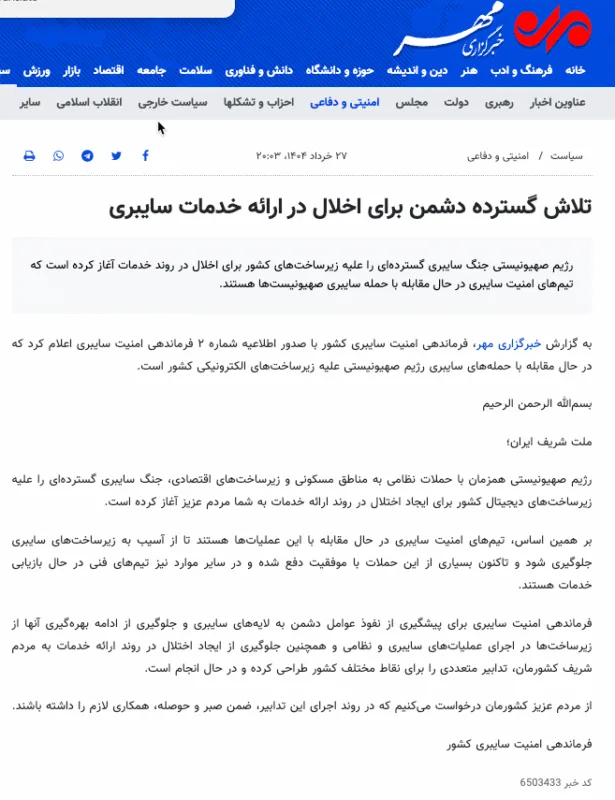Iran has recently slowed and, in some areas, nearly shut off internet access across the country in what officials describe as a “temporary, targeted, and controlled” measure to prevent cyberattacks, particularly from Israel, as regional tensions from Operation Rising Lion escalate. The move follows a series of missile exchanges and cyber operations between Israel and Iran, with both sides engaging in digital warfare alongside physical military actions.
Iranian authorities have significantly reduced internet bandwidth—by up to 80%—and in some cases, completely disconnected from the global internet, leaving only the national intranet (N.I.N.) operational. This has caused widespread difficulties for citizens, including problems contacting loved ones, accessing news, and using digital banking services. VPNs, which many Iranians use to bypass government restrictions, are also being blocked, further limiting access to foreign websites and apps.
Government spokesperson Fatemeh Mohajerani stated that the slowdown is intended to maintain internet stability and ward off cyberattacks, specifically targeting Israeli cyber operations. The Iranian Cyber Police (FATA) and the Supreme National Security Council have ordered a full cyber alert across all government systems, signaling heightened readiness for potential attacks on state infrastructure. Iranian citizens were notified of the new restrictions in an announcement from the country’s Cyber Security Command.

In the name of Allah, the Merciful, the Merciful
The noble nation of Iran;
The Zionist regime, along with military attacks on residential areas and economic infrastructure, has launched a massive cyber war against the country’s digital infrastructure to disrupt the process of providing services to you, our dear people.
Accordingly, cybersecurity teams are countering these operations to prevent damage to cyber infrastructure, and so far many of these attacks have been successfully repelled, and in other cases, technical teams are restoring services.
The Cyber Security Command has designed and is implementing numerous measures for different parts of the country to prevent enemy elements from penetrating cyber layers and preventing them from continuing to exploit infrastructure to carry out cyber and military operations, as well as to prevent disruptions in the process of providing services to the honorable people of our country.
We ask the dear people of our country to be patient and cooperate in the process of implementing these measures.
The digital warfare is intensifying, with a reported 700% increase in Iranian cyberattacks against Israeli targets since Israel’s initial missile strike on Tehran on June 12. Pro-Israeli hacktivist groups, such as Predatory Sparrow, have claimed responsibility for attacks on Iranian banks, disrupting services and infrastructure.
Iranian state-sponsored hackers and allied groups have also targeted Israeli and allied networks, with warnings issued to countries perceived as supporting Israel, such as Jordan and Saudi Arabia.
The internet restrictions are causing significant disruptions for civilians, who are unable to access timely war warnings, news, or essential digital services. Authorities have urged citizens to delete WhatsApp, alleging (without evidence) that the Meta-owned app is being used by Israel for surveillance. WhatsApp has denied these claims.
On the other side of the globe, the U.S. and other countries are warning businesses to remain vigilant, as the cyber conflict could spill over and disrupt critical infrastructure and supply chains globally. Hacktivist groups from other regions, including Russia and the Middle East, are also joining the digital conflict, further complicating the situation. Analysts are currently monitoring over 100 different threat actors who are conducting or at least claiming to conduct cyberattacks against either Iran or, more frequently, Israel.


